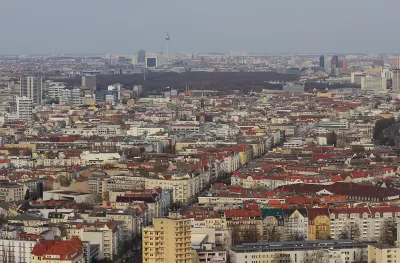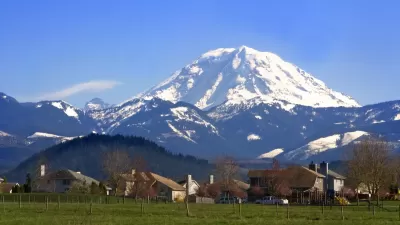Cities around the continent are taking steps to reimagine transportation, housing, and energy use with intriguing projects that could provide useful lessons for American cities.

In a guest essay in Volts, Michael Eliason highlights five "intriguing and powerful" European urbanism trends that hold useful lessons for the Biden administration. These include:
- Brownfield redevelopment: Cities all over Europe are turning brownfields into dense, livable, eco-friendly neighborhoods that take advantage of existing land and discourage sprawl. "Citizen participation is also a major component of these projects. Unlike in the US, this participation isn’t a wasteful exercise whereby local homeowners get to block new homes and preserve the status quo. Rather, these processes allow residents to have a say in what their new district can look like, where things should be located, and what kinds of open space or car-free areas it will have."
- Diversity in housing options: Unlike the largely single-family zoning found in many U.S. cities, "cities like Berlin, Vienna, and Freiburg have proactive land policies for non-market housing like social housing, cooperatives, and baugruppen. They award sites to projects incorporating sustainability, affordability, or other innovations." Meanwhile, social housing plays a major role in Europe; a quarter of Dutch housing is social housing, and Paris is aiming for 30% social housing by 2030.
- Rapid transformation: City leaders are working to expedite projects and take "rapid, productive steps" to implement plans that seek to transform cities, improve livability, and reduce environmental impacts. In a reversal of U.S. NIMBYism, some cities are embracing change as a positive constant. "Rotterdam is never finished," goes a slogan in the Dutch city. "Quality of life is always improving."
- Productive cities: The concept promotes a sort of radical mixed-use that brings production into the heart of the city. Production, Eliason writes, "can include urban agriculture, energy production, food production/processes, recycling centers, or any of the small-scale production processes that constitute industry 4.0." As Eliason asserts, "[p]roductive cities mark a return to the way cities developed centuries ago, but with significantly less pollution and safety hazard."
- Circular economy: The European parliament's Circular Economy Action Plan lays out concrete steps "to reduce waste, empower consumers, change food systems, and make sustainable products the norm."
FULL STORY: The 5 coolest trends in urbanism ... in Europe

Alabama: Trump Terminates Settlements for Black Communities Harmed By Raw Sewage
Trump deemed the landmark civil rights agreement “illegal DEI and environmental justice policy.”

Study: Maui’s Plan to Convert Vacation Rentals to Long-Term Housing Could Cause Nearly $1 Billion Economic Loss
The plan would reduce visitor accommodation by 25% resulting in 1,900 jobs lost.

Planetizen Federal Action Tracker
A weekly monitor of how Trump’s orders and actions are impacting planners and planning in America.

Wind Energy on the Rise Despite Federal Policy Reversal
The Trump administration is revoking federal support for renewable energy, but demand for new projects continues unabated.

Passengers Flock to Caltrain After Electrification
The new electric trains are running faster and more reliably, leading to strong ridership growth on the Bay Area rail system.

Texas Churches Rally Behind ‘Yes in God’s Back Yard’ Legislation
Religious leaders want the state to reduce zoning regulations to streamline leasing church-owned land to housing developers.
Urban Design for Planners 1: Software Tools
This six-course series explores essential urban design concepts using open source software and equips planners with the tools they need to participate fully in the urban design process.
Planning for Universal Design
Learn the tools for implementing Universal Design in planning regulations.
Caltrans
Smith Gee Studio
Institute for Housing and Urban Development Studies (IHS)
City of Grandview
Harvard GSD Executive Education
Toledo-Lucas County Plan Commissions
Salt Lake City
NYU Wagner Graduate School of Public Service





























